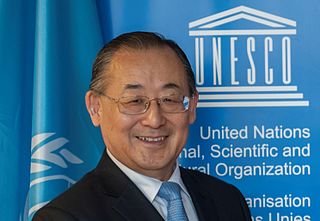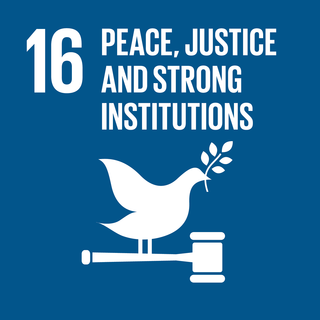International education refers to a dynamic concept that involves a journey or movement of people, minds, or ideas across political and cultural frontiers. It is facilitated by the globalization phenomenon, which increasingly erases the constraints of geography on economic, social and cultural arrangements. The concept involves a broad range of learning, covering, for instance, formal education and informal learning. It could also involve a reorientation of academic outlook such as the pursuit of "worldmindedness" as a goal so that a school or its academic focus is considered international. For example, the National Association of State Universities prescribes the adoption of "proper education" that reflects the full range of international, social, political, cultural, and economic dialogue. International educators are responsible for "designing, managing, and facilitating programs and activities that help participants to appropriately, effectively, and ethically engage in interactions with culturally diverse people and ideas."
The history of education in Africa can be roughly divided into pre- and post- colonial periods. Since the introduction of formal education to Africa by European colonists, African education, particularly in West and Central Africa, is characterised by both traditional African teachings and European-style schooling systems. The state of education reflects not only the effects of colonialism, but instability resulting from and exacerbated by armed conflicts in many regions of Africa as well as fallout from humanitarian crises such as famine, lack of drinking water, and outbreaks of diseases such as malaria and Ebola, among others. Although the quality of education and the quantity of well-equipped schools and teachers has steadily increased since the onset of the colonial period, there are still evident numerous inequalities in the existing educational systems based on region, economic status, and gender.

The Decade of Education for Sustainable Development (DESD) 2005–2014 was an Education for Sustainable Development (ESD) initiative of the United Nations. The Decade was delivered by UNESCO as lead agency, and gave rise to Regional Centres of Expertise (RCE) networks, and the GUPES universities' partnership. The launch of the United Nations Decade of Education for Sustainable Development started a global movement to reorient education to address the challenges of sustainable development. It was the first UN Decade to establish a global monitoring and evaluation process and expert group. Building on the achievement of the Decade, stated in the Aichi-Nagoya Declaration on ESD, UNESCO endorsed the Global Action Programme on ESD (GAP) in the 37th session of its General Conference. Acknowledged by UN general assembly Resolution A/RES/69/211 and launched at the UNESCO World Conference on ESD in 2014, the GAP aims to scale-up actions and good practices. UNESCO has a major role, along with its partners, in bringing about key achievements to ensure the principles of ESD are promoted through formal, non-formal and informal education.

The right to education has been recognized as a human right in a number of international conventions, including the International Covenant on Economic, Social and Cultural Rights which recognizes a right to free, compulsory primary education for all, an obligation to develop secondary education accessible to all with the progressive introduction of free secondary education, as well as an obligation to develop equitable access to higher education, ideally by the progressive introduction of free higher education. In 2021, 171 states were parties to the Covenant.

The International Bureau of Education (IBE-UNESCO) is a UNESCO category 1 institute mandated as the Centre of Excellence in curriculum and related matters. Consistent with the declaration of the decision of the 36th session of the General Conference and to ensure a higher effectiveness and a sharper focus, the IBE has defined the scope of its work as pertaining to: curriculum, learning, teaching, and assessment. The IBE-UNESCO provides tailored technical support and expertise to all UNESCO Member States facilitating the provision and delivery of equitable, inclusive, high-quality education within the framework of Education 2030 Agenda.
The UNESCO Institute for Statistics (UIS) is the statistical office of UNESCO and is the UN depository for cross-nationally comparable statistics on education, science and technology, culture, and communication.

The Sustainable Development Goals (SDGs) or Global Goals are a collection of 17 interlinked global goals designed to be a "shared blueprint for peace and prosperity for people and the planet, now and into the future". The SDGs were set up in 2015 by the United Nations General Assembly (UN-GA) and are intended to be achieved by 2030. They are included in a UN-GA Resolution called the 2030 Agenda or what is colloquially known as Agenda 2030. The SDGs were developed in the Post-2015 Development Agenda as the future global development framework to succeed the Millennium Development Goals which were ended in 2015. The SDGs emphasize the interconnected environmental, social and economic aspects of sustainable development, by putting sustainability at their center.
Global citizenship education (GCED) is a form of civic learning that involves students' active participation in projects that address global issues of a social, political, economic, or environmental nature. The two main elements of GCE are 'global consciousness'; the moral or ethical aspect of global issues, and 'global competencies', or skills meant to enable learners to participate in changing and developing the world. The promotion of GCE was a response by governments and NGOs to the emergence of supranational institution, regional economic blocs, and the development of information and communications technologies. These have all resulted in the emergence of a more globally oriented and collaborative approach to education. GCE addresses themes such as peace and human rights, intercultural understanding, citizenship education, respect for diversity and tolerance, and inclusiveness.

The Sustainable Development Goals (SDGs), also known as the 2030 Agenda for Sustainable Development, is a set of seventeen global goals for 169 specific areas developed by the United Nations during a deliberative process involving its 193 member states on 25 September 2015. As one of the participants, Iran pledged to carry out the 2030 Agenda. In December 2016, the Government of the Islamic Republic of Iran held a special ceremony announcing a national education initiative that was arranged by the UNESCO office in Iran to implement the educational objectives of this global program. The announcement created a stir among politicians and Marja' in the country.
The Incheon declaration is a declaration on education adopted at the World Education Forum in Incheon, South Korea on 15 May 2015. It is the logical continuation of the Education For All (EFA) movement and the Millennium Development Goals on Education, and many of its goals were based on a review of progress made since the 2000 World Education Forum in Dakar.

The International Commission on Financing Global Education Opportunity was set up in 2015 to reinvigorate the case for investing in education and to chart a pathway for increasing investment, especially in low- and middle-income countries. Chaired by United Nations Special Envoy for Global Education and former UK Prime Minister Gordon Brown, the Commission presented its report, The Learning Generation: Investing in Education for a Changing World, to United Nations Secretary-General Ban Ki-moon on September 18, 2016. The report called for "the largest expansion of educational opportunity in history.” The Secretary-General indicated that he will act on the Commission’s recommendations.

Qian Tang has been the Assistant Director-General for Education at UNESCO since April 2010.
TVET refers to all forms and levels of education and training which provide knowledge and skills related to occupations in various sectors of economic and social life through formal, non-formal and informal learning methods in both school-based and work-based learning contexts. To achieve its aims and purposes, TVET focuses on the learning and mastery of specialized techniques and the scientific principles underlying those techniques, as well as general knowledge, skills and values.

Action for Climate Empowerment (ACE) is a term adopted by the United Nations Framework Convention on Climate Change (UNFCCC). It refers to Article 6 of the Convention's original text (1992), focusing on six priority areas: education, training, public awareness, public participation, public access to information, and international cooperation on these issues. The implementation of all six areas has been identified as the pivotal factor for everyone to understand and participate in solving the complex challenges presented by climate change. The importance of ACE is reflected in other international frameworks such as the Sustainable Development Goals ; the Global Action Programme for Education for Sustainable Development ; the Aarhus Convention (2011); the Escazú Agreement (2018) and the Bali Guidelines (2010).
Global Reports on Adult Learning and Education (GRALE) are a series of reports that monitor progress on Adult Learning and Education (ALE), promote action, identify trends in the field of ALE, and explore solutions to challenges.

Sustainable Development Goal 16 is about "peace, justice and strong institutions." One of the 17 Sustainable Development Goals established by the United Nations in 2015, the official wording is: "Promote peaceful and inclusive societies for sustainable development, provide access to justice for all and build effective, accountable and inclusive institutions at all levels". The Goal has 12 targets to be achieved by 2030. Progress towards targets will be measured by 23 indicators.

Large-scale learning assessments (LSLAs) is defined as a form of national or cross-national standardized testing that provide a snapshot of learning achievement for a group of learners in a given year and in a limited number of learning domains.

Sustainable Development Goal 4 is about quality education and is among the 17 Sustainable Development Goals established by the United Nations in September 2015. The full title of SDG 4 is "Ensure inclusive and equitable quality education and promote lifelong learning opportunities for all".
Education management information systems (EMIS) aim to collect, integrate, process, maintain and disseminate data and information to support decision-making, policy-analysis and formulation, planning, monitoring and management at all levels of an education system. It is a system of people, technology, models, methods, processes, procedures, rules, and regulations that function together to provide education leaders, decision-makers and managers at all levels with a comprehensive, integrated set of relevant, reliable, unambiguous and timely data and information to support them in completion of their responsibilities.

The COVID-19 pandemic has had a considerable impact on female education. Female education relates to the unequal social norms and the specific forms of discrimination that girls face. In 2018, 130 million girls worldwide were out of school, and only two out of three girls were enrolled in secondary education. The COVID-19 pandemic may further widen the gaps and threatens to disrupt the education of more than 11 million girls. In addition, girls are less likely to have access to the Internet and online learning.












